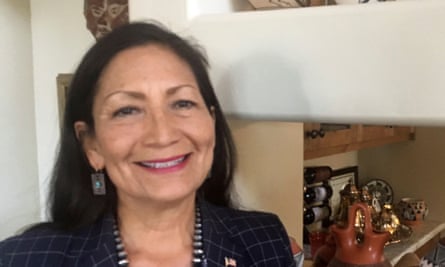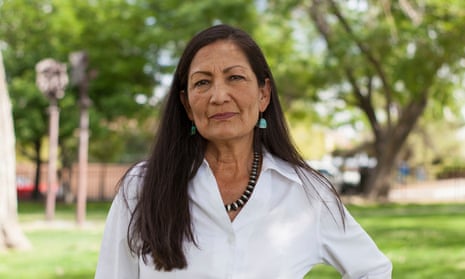Deb Haaland, the former New Mexico state Democratic party chair who is seeking to make history as the first Native American woman elected to Congress, had just one question before running: could she win?
Yes, she thought, she absolutely could.
“As a 35th-generation New Mexican, I felt I had a lot at stake,” Haaland said in an interview at a coffee shop near the US Capitol in Washington. “So I decided to run.”
Haaland is a citizen of the Pueblo of Laguna tribe and one of a record number of Native American women running for office this year. None have served in Congress – and the possibility of a landmark election is galvanizing voters in New Mexico.
“Congress has never heard a voice like mine,” Haaland says in a campaign ad that emphasizes her working-class background and progressive platform.
Last month, she soundly defeated five Democratic opponents to win the primary for an open congressional seat in a district that includes Albuquerque, the state’s largest city.
In November, she will face the Republican Janice Arnold-Jones, a former state lawmaker, and Lloyd Princeton, a Libertarian candidate, in a general election race that is expected to center on immigration, healthcare – and Donald Trump.
“Trump has given many people the courage to be bold in their racism. He gives the white supremacists and the far-right folks cause to be,” she said.
The president, Haaland says, is completely ignorant of Native Americans’ place in the country’s history. His repeated attacks on the Democratic senator Elizabeth Warren, whom he mockingly refers to as “Pocahontas”, are “disgusting and disgraceful”, she said. At a recent rally in Montana, Trump mused that he might “toss” a DNA test at the Massachusetts senator, challenging her claims to Native American ancestry.
“First of all, he doesn’t get to decide who’s native,” Haaland said. “And it is extremely disrespectful for him to continue to use the name Pocahontas as a racial slur.”
But she said Trump’s policies, even more than his words, posed an urgent threat to Native American land and traditions. Haaland pointed to the administration’s plan to enforce Medicaid work requirements for Native Americans, a move that tribal leaders say would restrict access to healthcare and undermine their sovereignty. She is also alarmed by the administration’s decision to shrink national monuments and roll back federal land protections.
The daughter of military veterans, Haaland attended 13 schools before she graduated high school. To pay her way through college, she decorated cakes and started a salsa business. She earned a law degree while raising a daughter as a single mother and working part time at an antique auction shop. At times, her family relied on food stamps, a reality she said many New Mexicans face as the state has one of the highest poverty rates in the country.

A longtime activist, who protested the construction of the Dakota Access Pipeline at Standing Rock and marched with women in Washington, Haaland is running on a progressive platform that includes Medicare for All, a $15 federal minimum wage and universal childcare and pre-K. She also supports calls to eliminate the Immigration and Customs Enforcement (Ice) agency and to impeach Trump.
If she wins, Haaland says her top priorities in Washington would be protecting the environment and growing a clean energy economy. She would also fight for more funding and resources to combat violence against women, a scourge that disproportionately affects Native women.
Her Republican opponent says voters in the district are more pragmatic than progressive – and that Haaland’s “extreme” positions on border security, oil and gas, and abortion will alienate moderates there.
“Quite frankly, the Democratic primary made this a very different election,” Arnold-Jones said. “My opponent is much further left than the district.”
Political analysts view it as safely Democratic. Hillary Clinton won the district by more than 16 percentage points and Democrats have held the seat since 2009.
Arnold-Jones anticipates Democrats will try to tie her to Trump, but she believes the president’s popularity is on the upswing in New Mexico thanks to a growing economy and the GOP tax cut plan.
“It has taken a little bit of time for the state to warm up to him but the result of his policies have been exceptionally positive,” she said, adding: “I actually think if the election were held today, the president would win.”
Haaland is part of a broader trend of Native Americans increasingly running for national office, after centuries of systematic persecution, marginalization and disenfranchisement.
The United States did not grant citizenship to Native people until 1924. But New Mexico, where Native Americans represent nearly 11% of the state population, did not fully enfranchise them until 1962. There are currently only two members of Congress who are Native American: the Oklahoma Republicans Tom Cole and Markwayne Mullin.
“Since 1789, we haven’t been able to elect a single Native American woman to Congress,” said Mark Trahant, the editor of Indian Country Today. “That it could finally happen is incredibly important.”
Partly driven by opposition to Trump and the #MeToo moment, dozens of Native American women are running for local, statewide and congressional office this year, a cohort that far outpaces past cycles, said Trahant, who is tracking the data.
It remains possible Haaland won’t be the only Native American female elected to Congress this year. Sharice Davids, a member of the Ho-Chunk nation, is running in a competitive Democratic primary in a swing district in Kansas, and Amanda Douglas, a member of the Cherokee nation, advanced to a runoff election in the Democratic primary for a deeply conservative Oklahoma congressional district.
Unlike many of the female candidates running for office in the wake of Trump’s election, this is far from Haaland’s first foray into politics. She worked for years in Democratic politics before an unsuccessful bid for lieutenant governor in 2014. She then served as the state party chair.
The historic nature of Haaland’s candidacy probably helped distinguish her in a race with little divergence on policy, said Joe Monahan, a longtime New Mexico political blogger. He recalled that New Mexicans elected the Republican Susana Martinez after she reminded voters that she would be “the nation’s first Hispanic female governor”.
“People like to make history. I don’t think that should be underestimated,” he said.
But Haaland’s primary success was not a marginal one, Monahan added. She sailed past her opponents in what was expected to be a competitive race by turning out a coalition of progressive voters that agreed with her on issues such as climate and healthcare.
In a Democratic district, she is positioned favorably ahead of the general election. A victory in November would seal her place in American history.
“It hasn’t really hit me,” she said.
“But every now and then I’ll get a sense from someone else and it makes me emotional because I realize that, for some people, they never thought they would see someone like them in Congress.”
